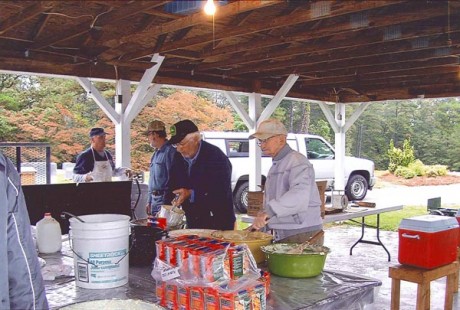Ingathering
Presbyterian churches in Hoke County and Robeson County carry on a longtime autumn tradition
By By Nathan Walls
A tradition that began in the early 1930s Great Depression lives on in Presbyterian churches in southeast North Carolina, particularly in Hoke and Robeson counties. Ingathering, held in October and November during harvest-time, brings together church members and friends in support of church operations and missions.
By tradition, Ingathering happens on a Thursday. Both Antioch Presbyterian Church in Red Springs and Shiloh Presbyterian Church in Raeford hold Ingathering the third Thursday in October. Bethel Presbyterian Church in Raeford holds Ingathering the first Thursday in November. Centre Presbyterian Church in nearby Maxton and churches in Saint Pauls and Laurel Hill also hold Ingathering.
There are three main draws for this tradition: raising money, seeing people, and the food.
Tish Evans of Antioch says it's the fellowship that matters most. "You see people who don't regularly attend church," she says, "and it brings people from all around. Some of the old members come back like a homecoming."
Former members who've moved away donate to Ingathering and past ministers return.
Ruth Wilkerson, who turned 89 in August, says she's been part of Ingathering at Shiloh since she was a child. The current generation is the fourth to carry on Shiloh's tradition, she says.
Bethel Presbyterian is a sister church to Shiloh. They share a pastor. Robert Wright, who is 70, has been part of Bethel's Ingathering since he was a boy. It runs in his family. His mother attended Antioch until she married his dad, and then she joined Bethel. And his grandfather was the legendary Flat McPhaul, a respected farmer and county commissioner. Flat McPhaul also was a famous Ingathering cook. And the cooking and eating supply the energy.
"When I was a boy at Bethel the men would cook the hogs all night," Mr. Wright remembers. "As time went on, we would go around to the farmers to collect hogs, and we would take them to Aberdeen to have them processed. That got too hard, so they started buying the hogs, so we only had to go to one place to collect the hogs. Then we got a little smarter, because we didn't have enough help. We get shoulders cooked. The men at Bethel reheat it and we do our own seasoning. We haven't had a complaint yet."
Nowadays the staples include barbecue and chicken salad plates. Mr. Wright says Bethel's barbecue is the best, an eastern style with a smooth, yet spicy taste accentuated with a vinegar-honey-and-grape jelly-based sauce.
Antioch is proud of its cakes, pies, candied sweet potatoes, homemade pimento cheese sandwiches, slaw and hush puppies. And then there's the liver hash. "That tradition has carried on since day one," says Tish's husband, Bill Evans. The liver hash, like liver pudding or livermush, contains a tasty mix of pork meat, pork liver, cornmeal and spices. Antioch sells theirs in one- or two-pound containers. If you attend Antioch's Ingathering, you also can get apples, cabbage, potatoes and canned goods.
Shiloh is known for Ruth Wilkerson's desserts, jelly and pear preserves. In the old days, church members would bring cotton, pigs and other items to sell. "They cooked the hogs out on the furnace," she remembers, "and served the food in the community building."
While the traditions, the goods for sale, and the food are unique at each church, one thing is common: hard work by members and volunteers. And your deeds do get noticed.
"Once you have a job at our church, you keep it for life," says Ruby Tuttle, from Bethel Presbyterian.
Bethel sells as much barbecue as they sell plates each year, about 500 to 600 pounds. Overall, Bethel brings in about $16,000 to $20,000 after feeding 1,400 to 1,500 people. Not bad for a church with a membership of 60. The money goes to Bethel's building fund.
Antioch's Ingathering funds — about $8,000 to $9,000 — go into the building and grounds fund. A portion of bazaar money goes to missions. Shiloh also has a good turnout, and Ingathering funds go to church operations.
But, as Mr. Wright says, "It's not all about the money." It's about a traditional strong bond that has lasted generations.
And most importantly, says Tish Evans, "You see the Lord's work."
About the Author
Nathan Walls is a freelance writer from Hope Mills.-
Share this story:


